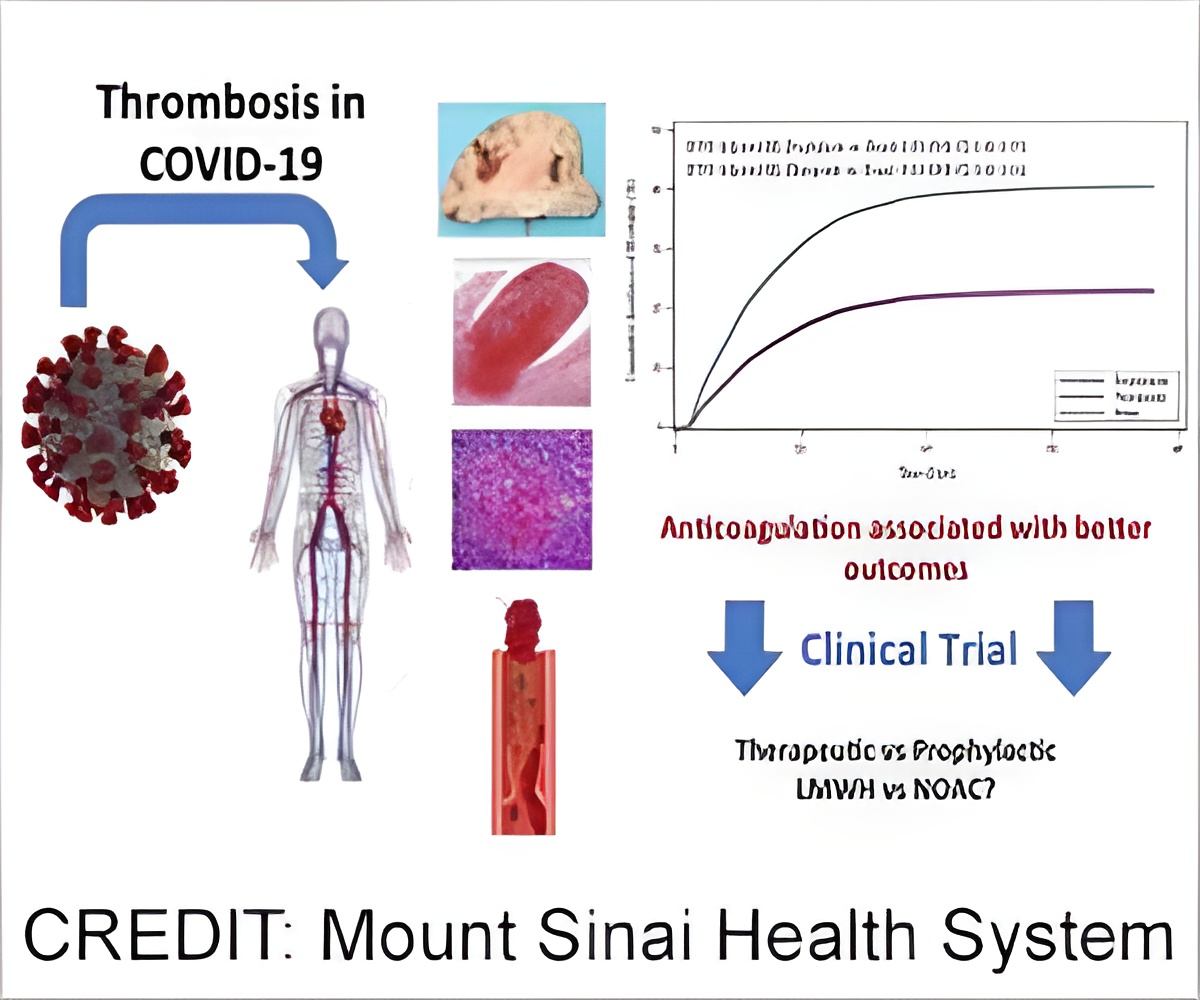In COVID-19 patients, all regimens of anticoagulants, the drugs that prevent blood clotting were found to be superior to no anticoagulants, revealed study.

‘Treatment with anticoagulants was associated with improved outcomes both in and out of the intensive care unit among hospitalized COVID-19 patients. ’





"This work from the Mount Sinai COVID Informatics Center provides additional insight on the role of anticoagulation in the management of patients admitted to the hospital with COVID-19. Although this is an observational study, it helped in the design of a large-scale international clinical trial that we are coordinating. The randomized trial focuses on those three antithrombotic regimens-- therapeutic and prophylactic subcutaneous low-molecular weight heparin, and therapeutic oral apixaban," says senior corresponding author Valentin Fuster, MD, PhD, Director of Mount Sinai Heart and Physician-in-Chief of The Mount Sinai Hospital. The work was prompted by the discovery that many patients hospitalized with COVID-19 developed high levels of life-threatening blood clots.
The team of investigators evaluated electronic medical records of 4,389 confirmed COVID-19-positive patients admitted to five hospitals in the Mount Sinai Health System in New York City (The Mount Sinai Hospital, Mount Sinai West, Mount Sinai Morningside, Mount Sinai Queens, and Mount Sinai Brooklyn) between March 1 and April 30, 2020. They specifically looked at survival and death rates for patients placed on therapeutic and prophylactic doses of blood thinners (oral antithrombotics, subcutaneous heparin, and intravenous heparin) versus those not placed on blood thinners. The researchers used a hazard score to estimate risk of death, which took relevant risk factors into account before evaluating the effectiveness of anticoagulation, including age, ethnicity, pre-existing conditions, and whether the patient was already on blood thinners. The researchers also took into account and corrected for disease severity, including low oxygen saturation levels and intubation.
Of the patients analyzed, 900 (20.5 percent) received a full-treatment dose of anticoagulants. Another 1,959 patients (44.6 percent) received a lower, prophylactic dose of anticoagulants, and 1,530 (34.5 percent) were not given blood thinners. There was a strong association between blood thinners and reduced likelihood of in-hospital deaths: both therapeutic and prophylactic doses of anticoagulants reduced mortality by roughly 50 percent compared to patients on no blood thinners.
Overall, 467 (10.6 percent) of the patients required intubation and mechanical ventilation during their hospitalization. Those on therapeutic blood thinners had 31 percent fewer intubations than those not on blood thinners, while those on prophylactic blood thinners had 28 percent fewer.
Advertisement
Separately, the researchers looked at autopsy results of 26 COVID-19 patients and found that 11 of them (42 percent) had blood clots--pulmonary, brain, and/or heart--that were never suspected in the clinical setting. These findings suggest that treating patients with anticoagulants may be associated with improved survival.
Advertisement
"These observational analyses were done with the highest level of statistical rigor and provide exciting insights into the association of anticoagulation with critical in-hospital outcomes of mortality and intubation," says first author Girish Nadkarni, MD, Co-Founder and Co-Director of the Mount Sinai COVID Informatics Center and Clinical Director of the Hasso Plattner Institute for Digital Health at Mount Sinai. "We are excited that results from this observational study in one of the largest and most diverse hospitalized populations have led to an ongoing trial of type, duration, and doses of anticoagulation. Ultimately we hope this work will lead to improved outcomes and treatment for COVID-19 patients."
"This work highlights the need to better understand the disease from a diagnostic and therapeutic point of view and the importance of conducting properly designed diagnostic and interventional studies," explains co-author Zahi Fayad, PhD, Co-Founder of the Mount Sinai COVID Informatics Center and Director of Mount Sinai's BioMedical Engineering and Imaging Institute.
Source-Eurekalert















